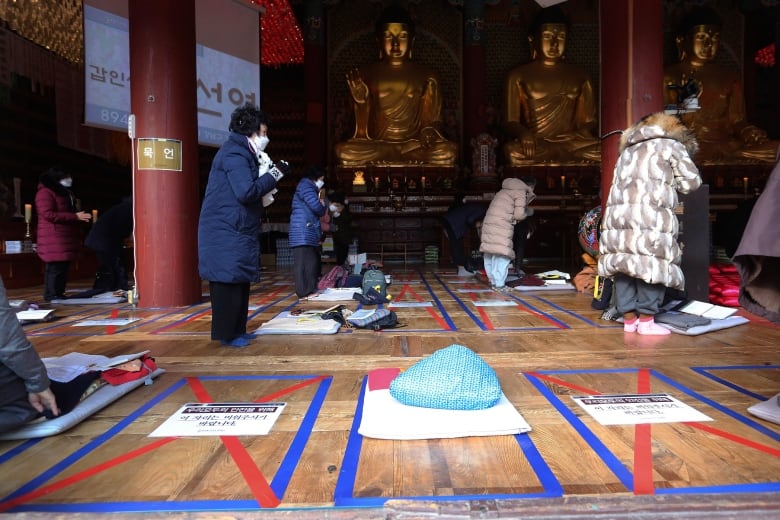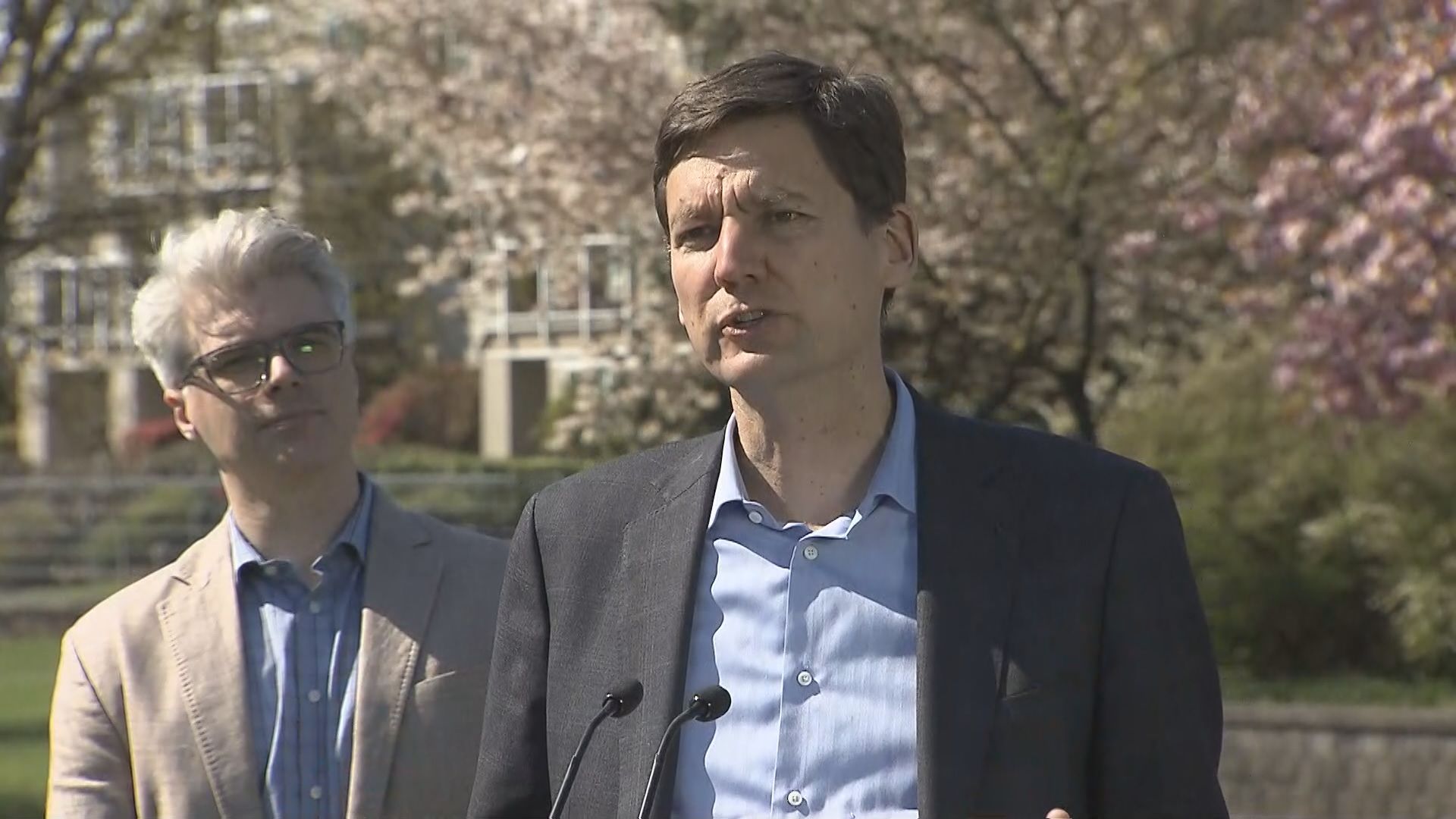Business
Coronavirus: What's happening in Canada and around the world on Sunday – CBC.ca
The latest:
Canada’s death toll from COVID-19 passed 12,000 on Sunday as the country’s chief public health officer said “rapid growth will continue” if Canadians don’t reduce their close contacts.
The country remains on a troubling path for new infections as case counts continue to mount, Dr. Theresa Tam tweeted on Sunday, adding “increasing contacts will be an even worse scenario.”
Her tweet reiterated the stark warning she made on Saturday, saying the country could see up to 10,000 cases a day in mid-December “if we continue on the current pace” of infection.
Canada is currently recording caseloads at about half that level, with the most recent seven-day average standing at 5,335 between Nov. 20 and Nov. 26.
1/2 To date, labs across 🇨🇦 have tested 11,344,925 people for <a href=”https://twitter.com/hashtag/COVID19?src=hash&ref_src=twsrc%5Etfw”>#COVID19</a>, w an average ~3.1% positive overall, for a rate of 301,813 people tested per million population in Canada. <a href=”https://t.co/jrZH3tHRUo”>https://t.co/jrZH3tHRUo</a>
—@CPHO_Canada
Also on Sunday, the federal government extended existing international travel restrictions to prevent the spread of COVID-19, barring entry to most travellers who are not Canadian citizens, permanent residents or people entering from the U.S. for “essential” reasons.
In a news release issued Sunday, Minister of Public Safety and Emergency Preparedness Bill Blair and Health Minister Patty Hajdu announced that travel restrictions on U.S. citizens and foreign nationals seeking to enter Canada from the U.S. will be extended until Dec. 21.
Similarly, restrictions on travellers arriving from other countries will be extended until Jan. 21, as will the mandatory requirement for anyone who is granted entry to self-isolate for 14 days upon arrival.
Emergency orders brought forward on Mar. 16 banned most foreign nationals from entering Canada for non-essential travel. There are a number of exceptions for immediate family members of citizens, essential workers, seasonal workers, caregivers and international students, to name a few.
By extending the expiration dates to the 21st of the month, today’s change brings the timing of the international travel restrictions in alignment with those governing the Canada-U.S. land border. Previously, international restrictions expired on the last day of each month while the Canada-U.S. border restrictions expired on the 21st.
What’s happening across Canada
As of 3 p.m. ET on Sunday, Canada’s COVID-19 case count stood at 368,670, with 63,074 of those considered active cases. A CBC News tally of deaths based on provincial reports, regional health information and CBC’s reporting stood at 12,023.
In British Columbia, two Chilliwack churches have vowed to hold in-person services in defiance of the province’s public health order barring gatherings. Chilliwack RCMP spokesperson Cpl. Mike Rail told CBC News that the orders “are not optional,” but that education rather than enforcement was the focus for officers.
Saskatchewan reported 351 new cases, but no new deaths.
Meanwhile, the number of cases amid an outbreak at the Saskatoon Correctional Centre has risen to 128. Inmates at the facility have launched a hunger strike to protest what they say are poor conditions that have exacerbated the outbreak.
Manitoba recorded 365 new cases of COVID-19 and 11 more deaths on Sunday.
Meanwhile, RCMP officers prevented people from accessing the parking lot of the Church of God south of Steinbach, Man. Police recently issued two fines to a minister at the church for attending a protest against COVID-19 restrictions and being at a Sunday religious service.
WATCH | Churchgoers near Steinbach, Man., met with police blockade:
More than 100 cars sat along a rural Manitoba highway as RCMP blocked the entrance to the parking lot for the Church of God’s planned drive-thru service. 1:36
Ontario reported 1,708 new cases of COVID-19 and 24 deaths on Sunday, with nearly 54,000 tests completed. Locally, there were 503 new cases in Peel Region, 463 in nearby Toronto and 185 in York Region.
Officials in the province have said it could take at least two weeks to see some improvements after the added restrictions were imposed on Monday.
Quebec reported 1,395 new cases and 12 deaths.
Meanwhile, the Maimonides Geriatric Centre in Montreal is transferring dozens of patients with COVID-19 to local hospitals on Sunday in an effort to contain an outbreak that has already killed 10 people.


New Brunswick recorded 14 new cases. An outbreak at a retirement-living complex in Saint John worsened after tests on all staff and residents found six more infections, bring the total to 15.
Newfoundland and Labrador reported four new cases.
Nova Scotia‘s caseload increased by 10, while Prince Edward Island‘s remained the same after reporting no new cases.
Nunavut reported 13 new cases — including 11 in the hard-hit community of Arviat — but the number of active cases declined to 112 after 32 people recovered.
What’s happening around the world
As of Sunday, there were more than 62.4 million cases of COVID-19 recorded worldwide, with more than 39.9 million of those considered recovered or resolved, according to a coronavirus tracking tool maintained by Johns Hopkins University in Baltimore. The global death toll stood at more than 1.4 million.
In Asia, South Korea is shutting down indoor gyms offering intense workout classes and banning year-end parties at hotels in the greater Seoul area to fight the virus. The country reported 450 new cases on Sunday. South Korea on Thursday registered more than 500 new virus cases for the first time in eight months.


In Europe, the Czech government said Sunday it is easing measures imposed to contain the new coronavirus due to falling numbers of new confirmed cases. All stores, restaurants and bars can reopen on Thursday in the country, which was among the hardest hit by a new wave of infections in the fall.
In the Americas, New York City Mayor Bill De Blasio announced the city will reopen its school system to some in-person learning and increase the number of days a week many children attend class.
In Africa, the continent has seen more than 2.1 million confirmed cases and more than 51,000 deaths. South Africa leads the continent on both counts, with more than 785,000 infections and more than 21,000 fatalities.
Business
New rules take effect to rein in short-term rentals, deliver more homes | BC Gov News – BC Gov News


New short-term rental rules that will deliver more homes for people are set to come into effect on May 1, 2024, as the Province releases additional information to guide hosts, platforms and visitors through the changes.
“The effect of short-term rental apps like Airbnb, VRBO and others has been the loss of thousands of long-term rental homes in the midst of a housing crisis, driving up the cost of housing for British Columbians,” said Premier David Eby. “That’s why our government has created balanced new rules to crack down on speculators who are effectively operating mini hotels, while also ensuring homeowners can still rent out spaces in their principal residence. As we’ve already seen, these new rules are turning short-term rentals back into homes for people who live and work in our communities.”
The new rules are aimed at reining in the growing short-term rental market that is taking homes off the market. Analysis from short-term rental data analytics company AirDNA, from March 2024, shows that more than 19,000 entire homes in B.C. are being listed as short-term rentals for the majority of a calendar year. Data from a McGill University professor about short-term rentals in B.C. also shows in June 2023 that the top 10% of hosts earn nearly half of all revenue.
“We are in a housing crisis that requires strong action to deliver more housing for the people who live and work in our communities,” said Ravi Kahlon, Minister of Housing. “The changes passed last fall to tackle the growing short-term rental challenges are already bringing more long-term homes back onto the market. As the rules for hosts and platforms come into effect, we are taking another strong step to deliver more long-term homes for people in communities throughout B.C.”
The new rules that will take effect May 1, 2024, are:
- The Principal Residence Requirement, meaning short-term rentals can only be offered in the principal residence of a host, plus one additional unit, secondary suite or laneway home/garden suite on the property in communities where populations are greater than 10,000 people.
- The Principal Residence Requirement will function as a provincewide floor for communities with populations of more than 10,000 people, but local governments will still be able to use existing bylaws and introduce additional bylaws that are more restrictive.
- The Principal Residence Requirement will come into effect in more than 60 communities throughout B.C.
- Strata hotels and motels that have been operating in a manner similar to a hotel or motel before Dec. 8, 2023, and that meet select criteria moving forward, will be exempt from the Principal Residence Requirement.
- Non-conforming use of property will no longer apply to short-term rentals. Under previous legal non-conforming use protections, if an existing use of land or a building did not conform to the new bylaw, it would have generally continued with legal non-conforming use.
- Short-term rental hosts will be required to display a valid business licence number on their listing, where a business licence is required by a local government.
- Short-term rental platforms will be required to share data with the Province.
- Local governments can request that a platform remove listings that do not display a valid business licence.
In addition to the short-term rental rules going into effect, 17 communities initially exempt from the legislation have requested to opt in to the Principal Residence Requirement. For those communities, the new short-term rental rules will take effect on Nov. 1, 2024. A full list is included in Backgrounder 2.
A first-of-its-kind in Canada, the short-term rental data portal has been created to support local governments with monitoring and enforcement of short-term rental regulations and will allow local governments to have the platform companies remove listings that do not comply.
The Provincial Short-Term Rental Compliance Enforcement Unit, which will be phased in beginning May 1, will also be able to conduct investigations into alleged non-compliance, which may result in administrative monetary penalties and compliance orders. Administrative penalties for hosts breaking the rules can range from $500 to $5,000 a day per infraction, and up to $10,000 per day for corporations, depending on the infraction. Visitors and guests will not face any fines. The unit will also facilitate data sharing and requests to platforms to remove listings.
Visitors with stays booked after May 1, 2024, at short-term rentals are encouraged to check with their host directly to confirm the host is complying with their local government regulations and with B.C.’s new short-term rental rules.
Full requirements for hosts and platforms to comply with the new rules have also been released and are available in Backgrounder 1 and here: https://www2.gov.bc.ca/gov/content/housing-tenancy/short-term-rentals
Turning more short-term rentals into long-term homes is part of the Province’s Homes for People action plan. Announced in spring 2023, it sets out further actions to deliver the homes people need faster, while creating more vibrant communities throughout B.C.
Quotes:
Walt Judas, CEO, Tourism Industry Association of British Columbia (TIABC) –
“TIABC applauds the government for listening to the tourism sector and introducing regulations that will address housing shortages in visitor-dependent communities and give municipalities the tools they need to manage short-term rentals. From our perspective, the Province has found the right balance to provide more permanent homes for workers in tourism and other sectors, while also ensuring a range of accommodation options for visitors.”
Ken Sim, mayor of Vancouver –
“These short-term rental rules are vital in tackling the housing crisis not just in Vancouver, but across British Columbia. We’re eager to implement these new tools and collaborate with platforms to ensure short-term rentals in Vancouver align with these regulations. These measures lay the groundwork for a more sustainable and equitable housing landscape where Vancouver residents can thrive.”
Learn More:
To learn more about the rules that take effect May 1, 2024, visit: www.gov.bc.ca/ShortTermRentals
To learn more about government’s Homes for People action plan, visit: https://news.gov.bc.ca/releases/2023HOUS0019-000436
To learn about the steps the Province is taking to tackle the housing crisis and deliver affordable homes for British Columbians, visit: https://strongerbc.gov.bc.ca/housing
Two backgrounders follow.
Business
Gas prices surge in some parts of Canada. What’s causing pain at the pumps? – Global News
A sharp uptick in gas prices is fuelling road rage in some parts of Canada on Thursday.
Many motorists filling up at the pumps are facing higher prices — some up as much as 22 cents from yesterday in parts of Ontario, for instance.
Data from GasBuddy’s live gas price tracker shows prices were 10.9 cents higher across Ontario for an average of $1.73 per litre by 4 p.m. Eastern Thursday, as compared to the previous day’s average.
Prices for gas rose by a similar degree in Toronto, but in southwest Ontario towns such as Sarnia, GasBuddy says the cost of gasoline has jumped 22.3 cents to $1.79 per litre as of 4 p.m. Other Ontario municipalities near the U.S. border such as Chatham and Windsor also saw double-digit jumps in the price of gas.
Ontario Premier Doug Ford shared his frustrations about the gas price hike on Thursday. Analysts had predicted prices would rise overnight due to a changeover to summer gasoline blends from winter fuel.

“You go out last night and you’re sitting there for 20 minutes in the line up to get gas, you know, and it’s unacceptable. Everywhere I was going, it was about a buck, 59. You wake up this morning and it’s $1.80. You know, it’s absolutely disgusting,” Ford said during an appearance in Oakville, Ont.
Quebec drivers were also seeing prices rise on Thursday, with a hike of 7.5 cents taking the province’s average cost past $1.80 a litre, according to the gas data. Montreal gas prices hit an average of $1.88 per litre as of 4 p.m., an 8.9-cent hike from Wednesday.
“Of course it will have an impact on our budget. So for normal people, regular people, families, it’s going to be tough,” Montreal Mayor Valérie Plante said Wednesday ahead of the price surge.
Gas prices in British Columbia were meanwhile inching towards the $2 per litre mark, rising 1.4 cents to an average of $1.95 as of 4 p.m. Eastern.
Prices were also a few cents higher in Newfoundland and Labrador and New Brunswick on Thursday, but were largely steady in the other Atlantic provinces and in the Prairies.
Dan McTeague, president of Canadians for Affordable Energy, told Global News that Western Canada and some U.S. markets made the switch from winter to summer gasoline about a month ago. Those regions are tied to the Chicago comprehensive prices while most of Ontario’s prices are tied to what happens in the New York Harbour, which switched to the summer blend on April 16, he said.
Winter gas is cheaper than summer blends because it contains higher butane levels — an inexpensive but volatile element which lowers the cost of fuel, Patrick de Haan, head of petroleum analysis at GasBuddy, told The Canadian Press.
The cost of producing summer gas is higher because butane levels are reduced to meet Canadian environmental regulations and lower emissions.
Where do gas prices go from here?
On a national basis, the price of gas was on average $1.74 per litre as of 4 p.m. Eastern. That’s up 6.5 cents from Wednesday and 18.7 cents higher than the average in March, according to GasBuddy.
De Haan said Thursday that pump prices are expected to come down in July.
McTeague told Global News that where gas prices go from here depends in part on volatility in the Middle East, where attacks on any given day can send shocks into the global price of oil.
He said it’s unlikely for Ontario to hit $2/litre this summer, but those prices may be in the cards for Quebec. In much of Western Canada, “what you see is what you get,” with prices expected to hold around current levels, he said.
But for those who missed out on fuelling up before the overnight spike, McTeague also predicted gas prices would drop back another five cents in Ontario and Quebec on Friday.
Statistics Canada cited higher gas prices as fuelling a slight uptick in inflation last month, which accelerated to 2.9 per cent annually from 2.8 per cent in February. Prices were rising at a faster rate in Western Canada in March, StatCan noted.
Higher global crude oil prices are traced to geopolitical conflicts stymying production, the agency said earlier this week.
De Haan told Global News earlier this month that geopolitical strife like Russia’s war on Ukraine, more expensive summer gas, increased demand for summer travel and maintenance at refineries would keep prices elevated.
“It’s becoming more obvious that with every yearly increase, it’s becoming less and less likely that we would see a sub-dollar-a-litre-price,” De Haan told Global News.
Canada’s price on carbon also rose earlier this month, rising $15 to $80 a tonne in provinces that have adopted the federal regime. The hike was expected to add about three cents to the cost of gasoline for Canadians.
This past Monday, some Canadians living in provinces with the federal carbon price received the first quarterly rebate tied to the program.
– with files from Global News’ Jacquelyn LeBel, Gabby Rodrigues, Nathaniel Dove, Aaron D’Andrea, Kalina Laframboise and The Canadian Press
More on Money
© 2024 Global News, a division of Corus Entertainment Inc.
Business
BC short-term rental rules take effect May 1 – CityNews Vancouver


Premier David Eby says that as B.C. inches closer to new short-term rental rules taking effect, 17 communities have decided to opt into the restrictions.
The update comes as the regulations surrounding how many and what kinds of short-term rentals are allowed in B.C. come into effect on May 1.
The BC NDP tabled the legislation in October of last year which, once in effect, aims to return short-term rentals to the long-term rental market.
As of May 1, the province is requiring short-term rental platforms, like Airbnb and VRBO, to share data and to remove listings without business licenses and registration numbers “quickly.”
It is also limiting short-term rentals to a property owner’s principal residence — plus one additional unit or suite on that property — for municipalities with more than 10,000 people. Municipalities with fewer than 10,000 people, or those designated as resort municipalities, will be able to opt into the legislation.
Those communities that have opted in, like the resort municipality of Tofino, will see the new laws come into effect on Nov. 1. Some other communities that have agreed to the new rules are Kent, Gabriola Island, Bowen Island, Osoyoos, and Pemberton.
The province says through regulations, the fines for hosts breaking municipal by-law rules will increase to $3,000 from $1,000, per infraction, per day.
“Short-term rentals themselves are not the problem,” Eby said in the update Thursday. “What has been the problem is inadequate oversight over this sector. And a group of people who have … said I’d like to actually buy up a whole bunch of homes that would otherwise be rented by people, or what other otherwise be purchased by families looking for a place to live, and I’d like to operate a private hotel chain through Airbnb or VRBO.”
“To give you a sense of the scale of the problem we face in British Columbia with this kind of activity [from] this small group of individuals, we have 19,000 entire homes in our province that are available year-round on short-term rental platforms,” he continued.
“And I can tell you that there are 19,000 families and individuals that are looking for a place to live, to buy, to rent right now, that are in competition with people that are looking to operate homes as hotels.”
Data from McGill University released in 2023 showed that the top 10 per cent of hosts in B.C. earn nearly half of all revenue created.
Eby added that, starting Thursday, a portal will be available for people to report operators for going against the new rules, and also giving hosts a platform to check their requirements of operation.
“These rules balance the need for long-term homes, including people and tourism and hospitality industry where the need to accommodate guests. As the premier mentioned, people are seeing long-term homes open up for rent, and more short-term rentals are being listed for sale or becoming long-term homes for families and individuals,” Housing Minister Ravi Kahlon said.
The province reiterated Thursday that short-term rentals are still “welcomed” in B.C., as long as they operate within provincial and local rules.
“We encourage people to continue to explore beautiful British Columbia and stay in legal short-term rental accommodations. We want guests, hosts, local governments, and platforms to know what to expect May 1,” Kahlon added.
Short-term rentals create big economic impacts: Airbnb
In a statement Thursday, Airbnb claimed a newly released economic analysis shows it generated more than $2.5 billion “in economic impact across BC in 2023,” and supported more than 25,000 jobs in the province.
“The analysis shows that for every $100 spent on an Airbnb stay, guests spent an additional $229 on other goods and services such as local businesses, restaurants, attractions, shops, and more,” the short-term rental agency said.
Airbnb believes the new “strict” short-term rental laws are “putting at risk billions in tourism spending and economic benefits.”
“BC’s new short-term rental law is going to significantly impact the province’s tourism sector, just as peak tourism season arrives – taking extra income away from residents, limiting accommodation options for guests, and potentially putting at risk billions in tourism spending and economic impact,” said Nathan Rotman, Airbnb Canada policy lead in the statement.
“At a time when BC is facing record deficits and economic growth is slowing, these new rules hurt resident hosts, tourists, communities and the economy as a whole.”
Airbnb is also contributing to tax revenue in the province, the agency claimed, explaining, “British Columbian Hosts on the platform generated approximately $93 million in taxes in 2023, bringing much-needed tax revenue for a province that’s projected to face a record high $7.9 billion deficit.”
You can watch CityNews 24/7 live or listen live to CityNews 1130 to keep up to date with this story. You can also subscribe to breaking news alerts sent directly to your inbox.
-



 Tech23 hours ago
Tech23 hours agoCytiva Showcases Single-Use Mixing System at INTERPHEX 2024 – BioPharm International
-



 Science5 hours ago
Science5 hours agoJeremy Hansen – The Canadian Encyclopedia
-



 Health19 hours ago
Health19 hours agoSupervised consumption sites urgently needed, says study – Sudbury.com
-
News19 hours ago
Canada's 2024 budget announces 'halal mortgages'. Here's what to know – National Post
-
News18 hours ago
2024 federal budget's key takeaways: Housing and carbon rebates, students and sin taxes – CBC News
-



 Investment5 hours ago
Investment5 hours agoUK Mulls New Curbs on Outbound Investment Over Security Risks – BNN Bloomberg
-



 Science19 hours ago
Science19 hours agoGiant, 82-foot lizard fish discovered on UK beach could be largest marine reptile ever found – Livescience.com
-



 Tech21 hours ago
Tech21 hours agoNew EV features for Google Maps have arrived. Here’s how to use them. – The Washington Post









